Greetings from
Fethiye
Turkey,
As
often mentioned in previous postcards, I always buy two seats on the long distance buses.
A 20 hour trip from Urfa to Fethiye definitely qualifies as long distance. In the past I've just asked for two adult tickets
and paid the full fair. This time I asked if there might be a reduction
for a child's ticket. There is, but we had a hard time deciding how old
a kid my bag should be considered. In the end the ticket agent just gave me a
discount off the full adult fare; I paid 85TL plus 60TL for the unused
seat to hold my bag. Now why didn't I think of that earlier?
Leaving Urfa at 14:00 most
of the trip proceeded in the dark through the night and I dozed between
bouts of kids screaming in the seat in front of me. A young mother tried
to comfort a tiny infant and her eighteen month old daughter without much
success. Across the isle sat
a young couple, both of whom loved to play with fidgeting tots
much to the relief of the harassed mother. During one of the operations
to pass the baby around among the three adult care takers, the young man
sitting in the isle seat in the row ahead just off to my right turned
and commented in English on his assumed role as surrogate father...
presuming I likely spoke English. "If these kids ever fall asleep, I'd
like to talk to you." he added.
Alan turned out to be a
Syrian refugee and spoke excellent English as well as Kurdish, some
Turkish and
Arabic. On the run to avoid military conscription by a government few in
the Kurdish community love, he freely shared his views about the civil unrest in his
birth country which has never recognized his Kurdish identity and
continues to marginalize that community.
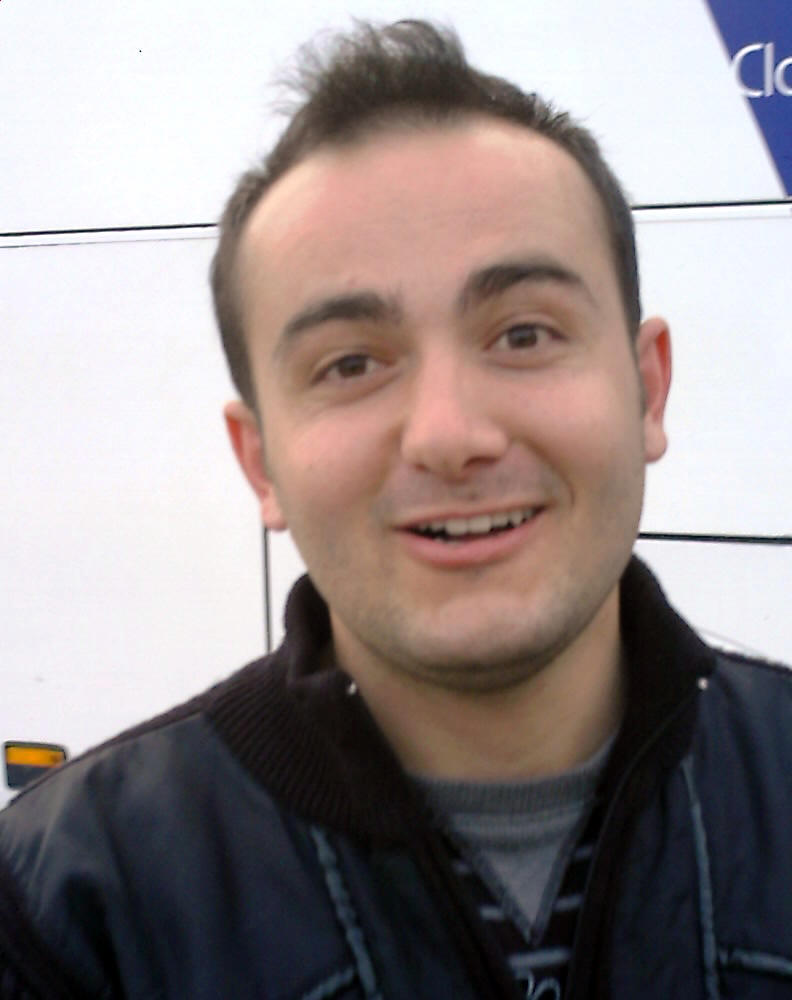 Intelligent and articulate, he worries about being called up
for the draft when he turns 24 next year. His half sister travels under
his protection as required by Islamic law. His parents remained behind in
their home located in the north-eastern Kurdish part of the country
despite imminent danger from military attacks, but encouraged him to
leave the country out of harm's way. Well dressed and well educated, he carried an
expensive high end laptop from which I deduced his family might be
fairly well off. After all the news stories about the flood of
Syrian
refugees invading surrounding countries and the pathetic television images of so
many struggling people, I found it refreshing to meet at least two
refugees who had the sense and the means to leave before the problems
became impossible.
Intelligent and articulate, he worries about being called up
for the draft when he turns 24 next year. His half sister travels under
his protection as required by Islamic law. His parents remained behind in
their home located in the north-eastern Kurdish part of the country
despite imminent danger from military attacks, but encouraged him to
leave the country out of harm's way. Well dressed and well educated, he carried an
expensive high end laptop from which I deduced his family might be
fairly well off. After all the news stories about the flood of
Syrian
refugees invading surrounding countries and the pathetic television images of so
many struggling people, I found it refreshing to meet at least two
refugees who had the sense and the means to leave before the problems
became impossible.
Through the night between his baby sitting duties we had several
thoughtful conversations. I asked about his knowledge of the civil
strife in Syria and the likely outcome and he grilled me for my views on
world religions, he himself being a non-practicing Muslim with atheistic
leanings. Alan thinks the situation is hopeless and that Assad is
unlikely to be ousted anytime soon, the many oppositions groups having
as much disagreement with one another as with the dictatorship in power. The bus left SanliUrfa at 14:00 and arrived the next day in
Fethiye at 09:00, long before Alan and I had resolved any of the issues
discussed. We parted that Saturday morning promising to stay in
touch... and I to record our encounter in one of my postcards (this
one).
This
is my second visit to the ocean side town of Fethiye with its huge yacht harbor and
year around holiday atmosphere so much like my old home town,
Santa Barbara. The surrounding mountains this time of year
have snow covered peaks adding to the unique character of this vacation
destination. Many Britains have immigrated to the city in order to take
advantage of inexpensive real-estate opportunities, something which
became obvious while eavesdropping on grocery store conversations.
The earlier trip back in 2001 allowed me
to write about experiences which on
re-reading prompted this return visit. But, now I better understand
the old saying: "You can never go back." The sleepy little village of my
memory is no more. So many of us wrote such nice things about this tiny
hide away it has not remained the secret treasure of a privileged few. No longer
do turtle doves compete with roosters to be our un-amplified alarm clocks
as the muezzins call the faithful to prayer using lung power alone.
Amplified calls from the few original minarets now reach even the power
sailboats anchored far out in the harbor. Thankfully, there still are so few
muezzins competing with one another their individual calls can be
distinguished... unlike the cacophony of yelling that sounds like a
cheering ball game crowd heard in Urfa as dozens of muezzins raised
their amplified voices to the castle heights.
A highlight of that 2001
visit became a motive for this return. Many warm memories of my
times in and around the Hotel Mara exaggerated my expectations. So
naturally, on arrival in the city I dashed over to the Mara
Hotel. Unfortunately, nostalgia had colored my memory and today the
hotel is mere shadow of what I remember twelve years ago. Still, I
checked in and prepaid for two nights in order to allow time for a more
leisurely re-familiarization of the older, colorful area around it. There
has been frantic development of the tourist infrastructure during the
past decade and now many excellent value hotels line the harbor area a
short distance from the old Mara.
As usual, I spent the
first few days hotel shopping and made a wonderful discovery:
the 120TL four star
Alesta Yacht Hotel not far from tourist
infrastructure comparable to Santa Barbara a couple decades ago. There
are so many charming cafes it would take the rest of the Winter to try
them all! While I don't expect to be here that long, I will hunker down
for an extended stay in this ideal hotel with excellent WiFi and hard
wired terminal Internet and try to catch up on some neglected work.
The Alesta Yacht Hotel, managed by 39 year old Ms. Cigdem sits a few yards from where endless rows of
extravagant yachts lay tied up to a walled harbor, providing a pleasant view from anywhere
at the front of the hotel. As
the breakfast fare at the Mara failed to make me happy, the first thing
I wanted to see at the Alesta would be the dining area. So, up the
elevator the bellman took me to the top floor where a bright room
surrounded by big windows awaited... briefly interrupting a private Sunday Brunch party
in progress! After that quick look down I went to enter the rate
negotiations. The charming and congenial receptionist, 24 year old Hatice
listened
to my explanation of extended travel requiring careful budget planning
and my expectation of many days in her hotel. "Take a look at the room
first," she encouraged "and then we can discuss the room rate."
I think
all receptionists must read the same negotiation manual as that ploy is
so common.
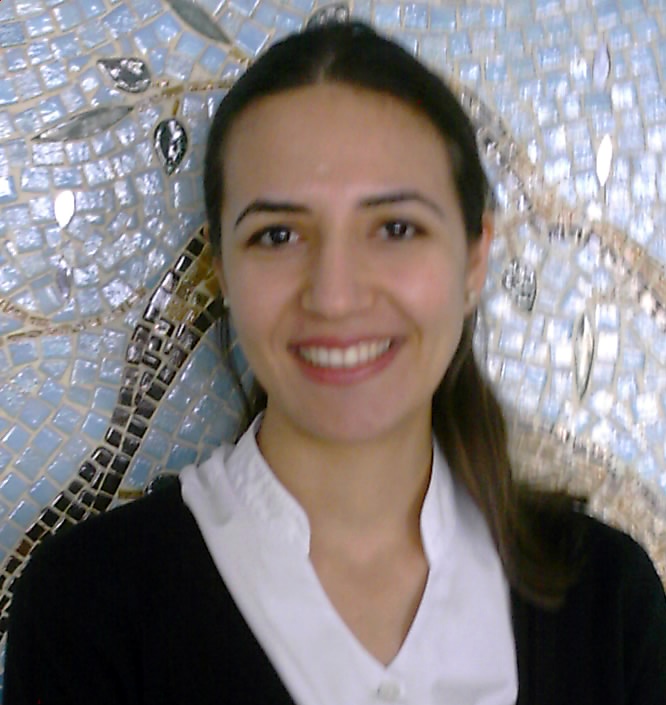 The room clearly had been designed by professionals and the
building recently constructed, modern and decorated in good taste. Back
down at the reception desk I proposed she check with her manager to see
if 100TL and a minimum stay of at least three nights might be
acceptable. She pointed out the hotel is still new having been built
only two years earlier and that the 120TL rate she had offered was
already well below the posted 170TL rack rate, but excused herself and
stepped into the adjacent office returning shortly with the verdict:
100TL (equivalent to $56) would be fine her manager decided. The normal
single walk-in rate of $67 during the Winter season is already an excellent value,
especially considering the unbelievably rich selection of foods in the
included breakfast buffet... and the unusually attentive and thoughtful
service of the staff. On two occasions while working at the Internet
terminal in the lobby someone brought me an unsolicited cup of
coffee! ... and a smile. (Note: Spring and Summer rates all over Fethiye jump 50% to
100% in most hotels.)
The room clearly had been designed by professionals and the
building recently constructed, modern and decorated in good taste. Back
down at the reception desk I proposed she check with her manager to see
if 100TL and a minimum stay of at least three nights might be
acceptable. She pointed out the hotel is still new having been built
only two years earlier and that the 120TL rate she had offered was
already well below the posted 170TL rack rate, but excused herself and
stepped into the adjacent office returning shortly with the verdict:
100TL (equivalent to $56) would be fine her manager decided. The normal
single walk-in rate of $67 during the Winter season is already an excellent value,
especially considering the unbelievably rich selection of foods in the
included breakfast buffet... and the unusually attentive and thoughtful
service of the staff. On two occasions while working at the Internet
terminal in the lobby someone brought me an unsolicited cup of
coffee! ... and a smile. (Note: Spring and Summer rates all over Fethiye jump 50% to
100% in most hotels.)
Yesterday morning while enjoying my fourth cup of breakfast coffee in the
fifth floor dining
room surrounded by a wall of glass, a violent wind storm revealed what
must have been an intentional design feature of the building: wind
pipes. I say designed because the musical sounds being made by the wind
blowing over open pipes somewhere reverberated throughout the dining room
and by design or accident were tuned
to produce varying harmonies in a single key... just like the wind
chimes hanging over my patio back home. The brief storm of gusting air
produced melodious sounds punctuated by the crashing accents of balcony
furniture falling over like snare drums and a huge tarp being ripped from
a covered
structure that sounded like kettle drums, all adding a dramatic element to the wind ensemble performance, a
truly unforgettable impromptu concert orchestrated by Mother Nature!
Most visits to the roof level dining room are more peaceful with
soothing Western background music interspersed with soothing silence...
and the vast panorama of nautical vistas singing for attention.
With a large screen
computer connected to the Internet available in the lobby, I spent a lot
of time working there between using my tiny netbook in the room. The
large screen made organizing photos more convenient. Fortunately, with
so few guests in the hotel right now hardly anyone uses the lobby
computer so I had it pretty much to myself. The hotel's technology
manager, Saban got the QWERTY keyboard translator working for me
eliminating the need to use brain contortions every time a word
contained the letter "i" needed to by typed.
The Alesta Hotel sits less than a city
block from the old
Telmessos
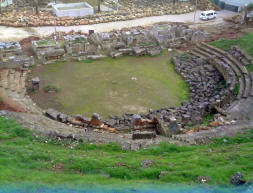 Amphitheater
discovered by archeologists shortly before my previous visit to
the city in 2001. Since then it has been the site of a new park
development with continual archeological excavation work along side the
new infrastructure work. Now surrounded by a two meter high construction
fence, access to the ruins themselves is restricted to archeologists and
their students. One group of college age people dressed for the campus
and carrying clipboards and tape measures hovered around one of the
partially exposed stone block walls recording measurements. Hundreds of
large stone blocks lay in ordered rows out in front of the excavation
area, all marked with identifying labels for eventual reassembly into
the restored amphitheater. While restoration is a huge undertaking, I
marveled at the effort which must have been expended to create the
original structure without the aid of power equipment.
Amphitheater
discovered by archeologists shortly before my previous visit to
the city in 2001. Since then it has been the site of a new park
development with continual archeological excavation work along side the
new infrastructure work. Now surrounded by a two meter high construction
fence, access to the ruins themselves is restricted to archeologists and
their students. One group of college age people dressed for the campus
and carrying clipboards and tape measures hovered around one of the
partially exposed stone block walls recording measurements. Hundreds of
large stone blocks lay in ordered rows out in front of the excavation
area, all marked with identifying labels for eventual reassembly into
the restored amphitheater. While restoration is a huge undertaking, I
marveled at the effort which must have been expended to create the
original structure without the aid of power equipment.
Naturally I had to revisit the old
Lycian Rock Tombs
I'd seen during my
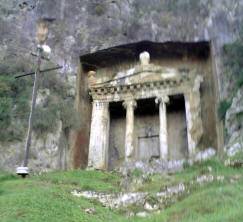 earlier
visit to the city. High on the cliff above the southern edge of the city
surrounded by neighborhoods of old stone dwellings hangs the iconic tomb
chamber looking for all the world like the face of a temple. The image
of this particular tomb became the symbol for the modern city of
Fethiye. It is amazing how much steeper is the trail up to the area of
the tombs today compared to my experience twelve years ago at the young
age of 66. There must have been an earth upheaval during the intervening
years. Surely there could not have been so much deterioration in my
personal stamina in a mere twelve years! On the way back down the many
flights of stone stairs I briefly became dizzy. With increasingly
brittle bones I know falling is no minor matter and cautiously
maneuvered the rest of the way down, resolving to reassess plans for
future adventurous escapades... possibly aided by one of those fancy
carved canes?
earlier
visit to the city. High on the cliff above the southern edge of the city
surrounded by neighborhoods of old stone dwellings hangs the iconic tomb
chamber looking for all the world like the face of a temple. The image
of this particular tomb became the symbol for the modern city of
Fethiye. It is amazing how much steeper is the trail up to the area of
the tombs today compared to my experience twelve years ago at the young
age of 66. There must have been an earth upheaval during the intervening
years. Surely there could not have been so much deterioration in my
personal stamina in a mere twelve years! On the way back down the many
flights of stone stairs I briefly became dizzy. With increasingly
brittle bones I know falling is no minor matter and cautiously
maneuvered the rest of the way down, resolving to reassess plans for
future adventurous escapades... possibly aided by one of those fancy
carved canes?
Two of my favorite things
to do in a new city are riding city buses and people watching from
the elevated dining rooms found in most Mac Donald's and Burger King
restaurants: cheap and satisfying. Both these activities have the added virtue
of providing an opportunity to rest between my still lengthy hikes of
exploration... although now taken at an increasingly slower pace... more like
strolling with frequent pauses to soak up the ambiance. Lately I've
noticed a good many local wrinkled ones doing the same thing. ... must be
a characteristic of acquiring wisdom, you think?
Somewhere between Iraq and
here my little netbook became infected with a deadly virus. The first
symptoms were a slowing of performance and unusual index searching
activity. Checking the firewall I discovered the "do
not allow exceptions" block unchecked and promptly fixed that. Performance
improved, but off and on slowed again.
Then a week later while in
the Mara Hotel in Fethiye I suffered a bout of stupidity: a couple email
messages, apparently from a good friend with no text and only provocative website
links peaked my curiosity and I clicked on one of them. It took me to
an innocuous looking site promoting health foods, perfectly consistent
with my friend's natural life style. The next time I started the computer it
hardly crawled toward the expected display and I decided to restore the system to
an earlier time when everything had been working properly. BUT, all of
the old restore points before two days earlier in the Mara Hotel were
gone! Befuddled and suspicious I selected the earliest restore point
available and waited.
When the machine
automatically shut down and started to reboot, the blue screen of death
popped up and nothing I had been trained to do would allow me to recover
a working system. The <F8> screen permitted an analysis of the failure:
UNMOUNTABLE_BOOT_VOLUME! The hard drive had been corrupted beyond
ordinary repair. Saban, the competent hotel technology manager and I
tried several recovery tactics including the use of
Hiren's BootCD, a mini-WindowsXP
utility with a reputation for rescuing files on corrupted drives, but
nothing worked. Resigned to loosing a few un-backed up folders
containing photos, I executed the factory restore feature built into the
Acer AspireOne netbook. That worked flawlessly and a few hours later,
thanks to backup copies of important files stored on a thumb drive,
almost everything returned to normal. Amazing, this technology.
Back in 2001 I remember
commenting on sleeping dogs seen around the city. There still are lots of
dogs and still frequently sleeping! However, I've heard not a single one of
them barking or making any kind of sound around the waterfront. During my walks out into the
rural areas I did hear dogs barking, but none in the city. Curious, I started asking
locals why that might be. The answers included: "We love our pets and
treat them lovingly." or "I guess there is nothing to bark at here in
peaceful Fethiye." or just "I hadn't noticed."
With none of the answers
satisfying my wonderment I went to the Internet to see if others had
noticed the phenomenon. According to a story in the
local paper, last century barking dogs became an issue in the
city and ordinances eventually were passed requiring pet owners to keep their
animals quiet so as not to disturb their neighbors. About the same time
a group of animal lovers organized a pet rescue program with the
financial support of European donors. Over the years the program
originally started
by
Perihan Agnelli
evolved
into the formal Neuter & Return Program where stray animals were picked
up and neutered before being returned to where they had been found.
Neutering for male dogs involved castration which naturally reduced the
animal's aggressive nature... and barking! Now, twenty years into the
program there are a lot of very quiet canines in Fethiye. The
local N&RP program gained national notoriety and is now considered a
pilot project for possible national adoption. Not all dogs have been
neutered, of course. In fact, during the early morning walk around 8AM
over to the otogar (bus station) on my last day in the city I heard many of the pooches
reestablishing their territories and greeting one another. By 9AM all
became quiet again, though.
Turkish people like their
tea sweet and apparently highly diluted because most people take perhaps
a quarter glass of the actual brewed tea and then top off the glass with
hot water before adding two, three or more lumps of sugar. The just
filled glass is always too hot to hold so people sip while gingerly
holding the cooler rim of the glass briefly before sitting it down
between sips. When asked why the odd shape of the glass I got a variety
of answers: "It is just custom.", "It is shaped like the figure of a
woman making it more interesting to hold.", "I haven't the slightest
idea! That's a good question." Whatever the actual reason, that
tulip shaped
glass is used everywhere in Turkey I've traveled.
Getting a haircut remains
a problem for men wearing their hair anyway but short. However, many Fethiye
youth have embraced a modern outlook on fashion and more than a few male
heads sport abundant bushes. So, I started looking for a hair dresser
shop that might be willing to take care of men with shaggy manes.
Sheepishly I loitered around several shops to see if any had male
clients, without success. Then, at the last one checked and about to
walk on, one of the women inside motioned for me to come in. Gingerly I
stepped inside the ten chair shop and waited while a minor commotion
broke out among the hair dressers and clients. At last, a male barber
appeared, alerted by calls from the ladies and motioned for me to sit
down in his chair. With gestures we established my desire for "just a
little" off the sides and back. His technique varied somewhat from what
I've seen in America, but he got the job done adequately and I paid my
15TL plus 1TL tip and left a happy, less shaggy man.
Local
walking groups use the sidewalk around the harbor just as we did in
Santa Barbara. It really does feel like home in a way.
Being next to that big Mediterranean heat sink,
Fethiye is supposed to be warmer than further inland. In reality it is
still darned cold
here. What clothes I
carry have been enough to prevent a premature death from exposure, but
not enough to interfere with the enjoyment of being inside a warm cozy cavity
somewhere.
I've given up on trying to make any sense out of the Shutterfly slide
show service, so you will have to visit my
website
for the pictures taken during this episode.
As for the Merry Christmas thing, it passed pretty much unnoticed in
this part of the world; I heard not a single carol on the long bus ride
out of Iraq on Christmas day! I'll soon be heading further north,
possibly to Izmir or Bursa. Until I again pause near an Internet access point,
PS: 18 January 2013
In September 1955 after three years of intentionally enriched and
extended study at two different junior colleges I headed north to UCB
for a professional university education. My noteworthy accumulation of
worldly goods consisted of a snazzy 1950 Nash Rambler with it's fold
down seat converting into a bed, a cracked Gibson guitar and what money
I'd managed to save while working as a draftsman during the summer. On
the way a piston in the car's engine came loose and only by driving at
exactly 44 mph could I keep the engine from shaking itself into
oblivion. As the highway passed through a central California town
notorious for its speed traps one of the town's cops stopped me for
exceeding the posted 30mph limit and issued an expensive citation.
With careful adjustments I managed to resume the journey north by either
creeping or holding to the precise vibration free speed. Late that
evening the engine finally burped loudly and jerked to a stop on the
freeway just outside the Berkeley city limits. A CHP cop pushed my dead
car off the freeway and into a dark gas station parking area where I
lingered licking my wounds, finally folding the passenger seat down into
a bed and falling asleep.
On awakening the next morning I hitchhiked over to the UCB campus to
confirm my semester reservations for room and board at the International
House on campus. All of the official offices remained closed this Sunday
morning and the weekend reception people could find nothing in their
records indicating I had a room reserved! The day before the semester
registration begins is no time to be looking for a room to rent near a
major university campus so I wandered the area pondering my dismal
options.
Across the street opposite the I-House an old man shuffled along the
sidewalk aided by crutches, every step seeming to require enormous
determination. The sight of the old guy making such an effort to defy
decrepitude made me realize just how small my own "big" problems
actually were. In a couple minutes we were side by side and I decided to
cheer myself up by saying something kind to the old fellow. It turned
out he lived in a house a short distance down the block and daily tried
to get some exercise by walking a little, "On doctor's orders!" he
nonchalantly shrugged.
A half a block later he paused his slow shuffle and nodded at a huge
mansion to our left and added: "This is where I get off." grinning
mischievously. My good Boy Scout deed for the day completed I smiled and
said "goodbye," but before I could take a step he noted we had not
finished our conversation. Clearly the old guy wanted to talk more. So I
lingered and answered his questions about my academic plans while he
interjected tidbits about his situation.
Now long retired from teaching, Professor
Charles Albert Noble, not related to Alfred Nobel of TNT fame,
lived
comfortably on a University pension plus investment income in a house now
much too large for someone living alone... even with the full time help
of a live-in housekeeper-cook and a gardener-chauffeur. To keep the big empty
house from going to waste he regularly let a few students have the
unused bedrooms for a semester. He concluded by noting how much he
enjoyed talking with young people and asked if I would like to come back
that afternoon for a drink. The ambiguity of the situation intrigued me
and I promised to join him at his suggested time after spending the
morning earnestly looking for someplace to call home for the coming
school year.
When I returned to the big mansion that afternoon the housekeeper, a
severe lady almost as old as the professor, stiffly led me into his
dimly lit book lined study where I met a rough looking German graduate
student, Hans currently occupying one of the student bedrooms. A few
minutes later the professor joined us repeating his offer of whiskey.
Sipping the spirits, the old man told us of his long career teaching
undergraduates various mathematics disciplines, about the gay times he
had entertaining colleagues during Prohibition with bathtub gin in the
cavernous mansion, about his regrets for never fathering children;
nostalgia flavoring every word spoken slowly, deliberately.
All the furniture in the house while obviously quite old and faded continued to be lovingly cared for
and still spoke of quality and good taste. When Hans
finished his drink he excused himself and left, leaving the professor
and me to continue our stories. Realizing the afternoon would soon become
night and I had still not made any arrangements for a place to stay for
the semester or even for that night other than in my disabled car, I
alerted the professor to my urgent needs and suggested we continue our
talks another day. That is the point where he revealed one of his other
resident students had vacated a room in his three "student" bedroom wing
and wondered if I might like to join his little academic
rooming-house... "just the bedroom and shared bathroom; no meals... but
no cost to you."
His offer stunned me, despite the fact I had guessed something of the
sort might be on his mind from things he had been saying during our
short walk that morning. A day that had started with one catastrophe
after another looked like it might end at the extreme opposite end of
the disappointment spectrum. I naturally accepted his offer immediately,
noting he had probably saved me from sleeping in the park that night.
With all my meager belongings still in the disabled car some distance
away, he summoned his liveried chauffeur, Ansel and instructed him to
assist me in any way he could.
Ansel frowned at me as we walked around the back of the house where the
professor's dark blue Packard limousine sat as shiny and new looking as
the day it had rolled off the assembly line twenty years earlier. As we
walked Ansel sternly warned me not to take advantage of the professor's
kindness as so many earlier students had. We then launched into a
discussion of what to do about my distant dead car, finally concluding
the powerful Packard could pull it to the house and we could temporarily
park it under a tree in the backyard until I could make more permanent
arrangements.
The following day, a Monday after my first night in the professor's
house I dashed across the street to the now open International House
business offices and inquired about my room reservation, planning now to
cancel it. The clerk searched through several tub files, finally
announcing she could find no record of a room reservation, but there
would be no problem with taking my meals in the I-House cafeteria.
In between registering for classes I interviewed for a part time job as
a student lab assistant with a Professor Kaufman in the School of Public Health
doing ground water flow studies using radio isotopes and recently
available gamma ray spectrometry equipment. After a half hour
interrogation he hired me on the spot. I couldn't believe how events had
perfectly meshed this first 48 hours of my new career as an upper
division university physics student.
So, that first year I slept in the old professor's mansion and took my
meals in the International House across the street. Over the weeks the
same bunch of people tended to share the same dining room tables. I
suppose this might have been my first introduction to foreign cultures
and a resulting life long interest in understanding them. At some point
I began bringing my copy of a collection of optimistic aphorisms
entitled, The Brighter Side and reading one of the inspirational
quips to anyone who would listen. The jacket carried the cheery thought:
"Every cloud has a silver lining." Jackie, a graduate student several
years my senior and much wiser, delighted in announcing anytime she saw
me with that book: "Remember, every silver lining has a cloud."
So, now we come to the purpose of this shaggy dog story. Last Friday
night in the Alesta Yacht Hotel, drowsy and ready for sleep around 9PM a
noisy party erupted in the dining room on the floor directly above my
bed. Loud drums guaranteed I'd get no sleep until the revelry ended. So,
I pulled on some trousers and shoes and disheveled rode the elevator up
one flight. The elevator doors opened not more that ten feet from a
lavish banquet table where all the elegantly dressed non-dancing guests
glowered at me standing there arms akimbo as I glowered back before
hitting the down button again to reach the lobby floor and reception
desk. Fortunately, the guy on duty spoke some English and responded to
my question: "How long is that noise going to last? I don't think I can
sleep with it; it is really loud in my room."
"Not much longer." he replied. I wondered aloud about the actual time
and instead of answering my question he offered to let me use one of the
empty rooms on a lower level "just to sleep for the night... no need to
move all your stuff." he added.
I repeated my question: "Eleven or twelve?"
"Eleven." he replied after a brief pause to consider.
"O.K. That will be no problem. I don't want to rain on anyone's parade.
Even twelve wouldn't be too unreasonable." With that I returned to my
room and noticed the highly amplified music with deep throbbing drum
beats noticeably subsided for five or ten minutes and then resumed until
exactly eleven PM when it stopped... for about five minutes and then
resumed again full blast until stopping completely at exactly midnight.
What I didn't know... the owner of this gorgeous new hotel was hosting a
pajama party and entertainment for more than a dozen guests including
this late Friday night blast... and also that Sunday brunch into which I
had stumbled a week earlier while checking out the hotel. My guess is
that he was taking advantage of the low occupancy during this doldrums
period of the Winter off season.
I learned later the hotel only had three paying guests at that point.
The other two would be leaving the following Sunday in two days as it
turned out. I had previously threatened to stay another week, but
developments in the wake of the loud party prompted me to change my
plans. No doubt the owner felt irritated by my aggressive party
intrusions and noise complaints, figuring his staff should be able to
handle such nuisances... and they did.
Saturday morning breakfast in a dining room still torn up from the party
the night before became a plate of cheeses (which I avoid), baloney
slices, cucumbers, tomatoes, halava, bread and coffee; sort of after
party left overs. The lavish buffet of the previous week replaced by
make-do nourishment, a separate plate for each of their three paying
guests.
An all business waiter replaced attentive Baris from the previous
mornings. On returning to the room I discovered the toilet failed to
flush consistently. Reporting the problem at the reception desk I
learned nothing could be done about plumbing until the following Monday
when the maintenance staff returned, but they could move me over to
another room on the same floor if I would like. As the toilet did
occasionally flush I decided to just live with it. On return that
evening after being out most of the day the toilet failed completely,
but I managed to use the bidet feature to perform a slow flush of sorts.
The next morning, Sunday while trying to decide what to do, repeated all
the problems of Saturday, but now included weird behavior by sweet,
previously compassionate Hatice, the 24 year old receptionist who had so
favorably impressed me during check-in. Naturally empathetic, this
situation must have put her in a very uncomfortable and awkward
position. As her job depended on doing as her boss wished, concern for
the guest's well being had to be subordinated, an unnatural thing for a
young, tender soul like Hatice. As she switched to her very formal
professional hotel voice she made it clear only undesirable choices were
left for me and I decided on the spot to end everyone's agony and let
the owner have unfettered range with his expensive hotel toy .
None of this changes my general assessment of the hotel, physical plant,
location, services and well trained staff. But, watch out for the owner
if he happens to be in residence and playing host to a group of friends.
That will no doubt take precedence over any inconveniences which might
be caused ordinary paying guests. After all, it is his house! Were our
roles reversed, I might have reacted as he did though in retrospect
would have alerted guests to the pending loud Friday night noise and
offered them a room change before it became an unexpected irritation.
Everyday is a surprise; some pleasant, some less so, but each an
opportunity to learn and grow. FB
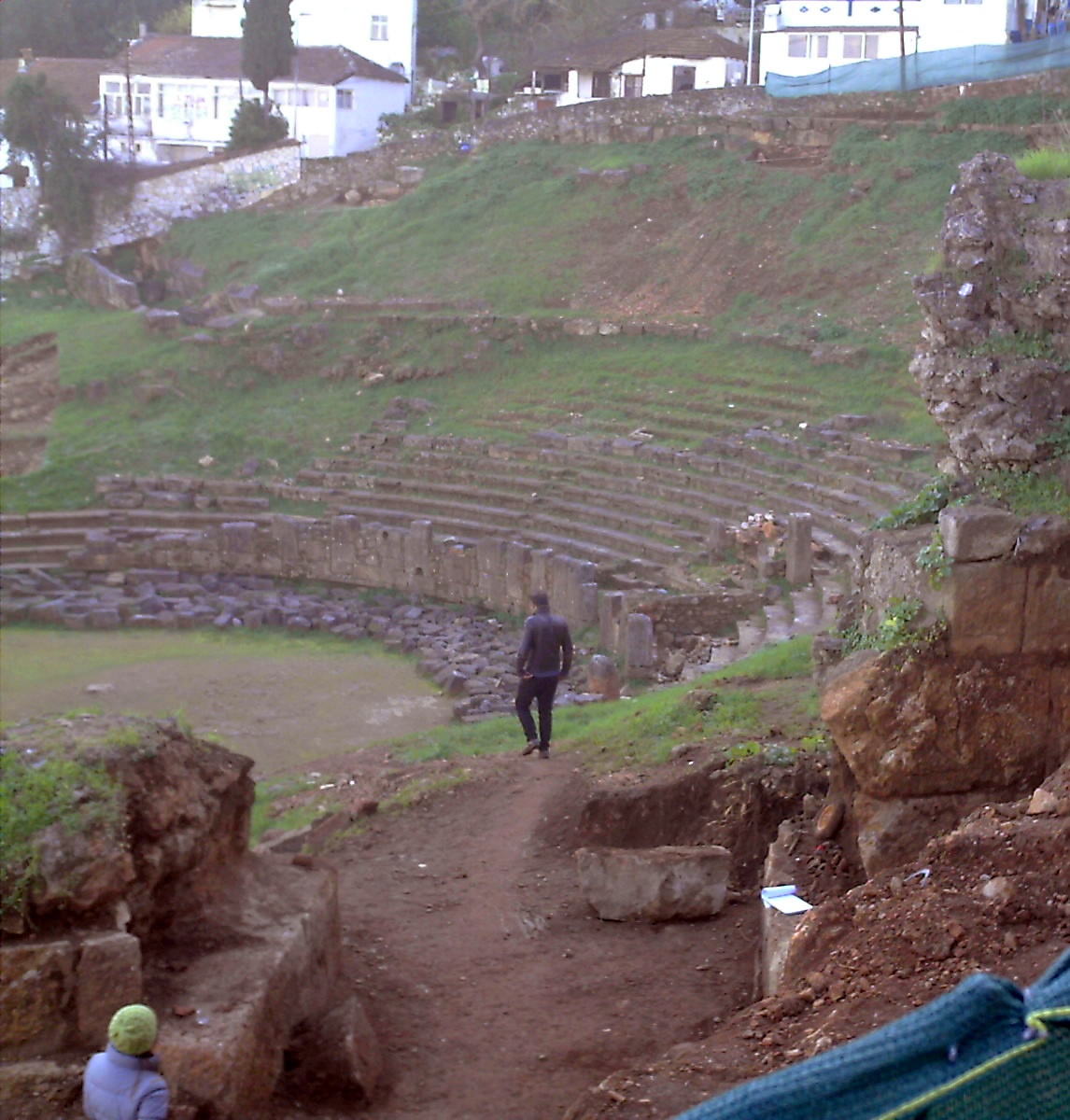
Fethiye - Excavation continues at
the ancient Telmessos Amphitheater located at the southern end of the
current city and close to the harbor.

Fethiye - Excavation
continues at the ancient Telmessos Amphitheater located at the southern
end of the current city and close to the harbor.
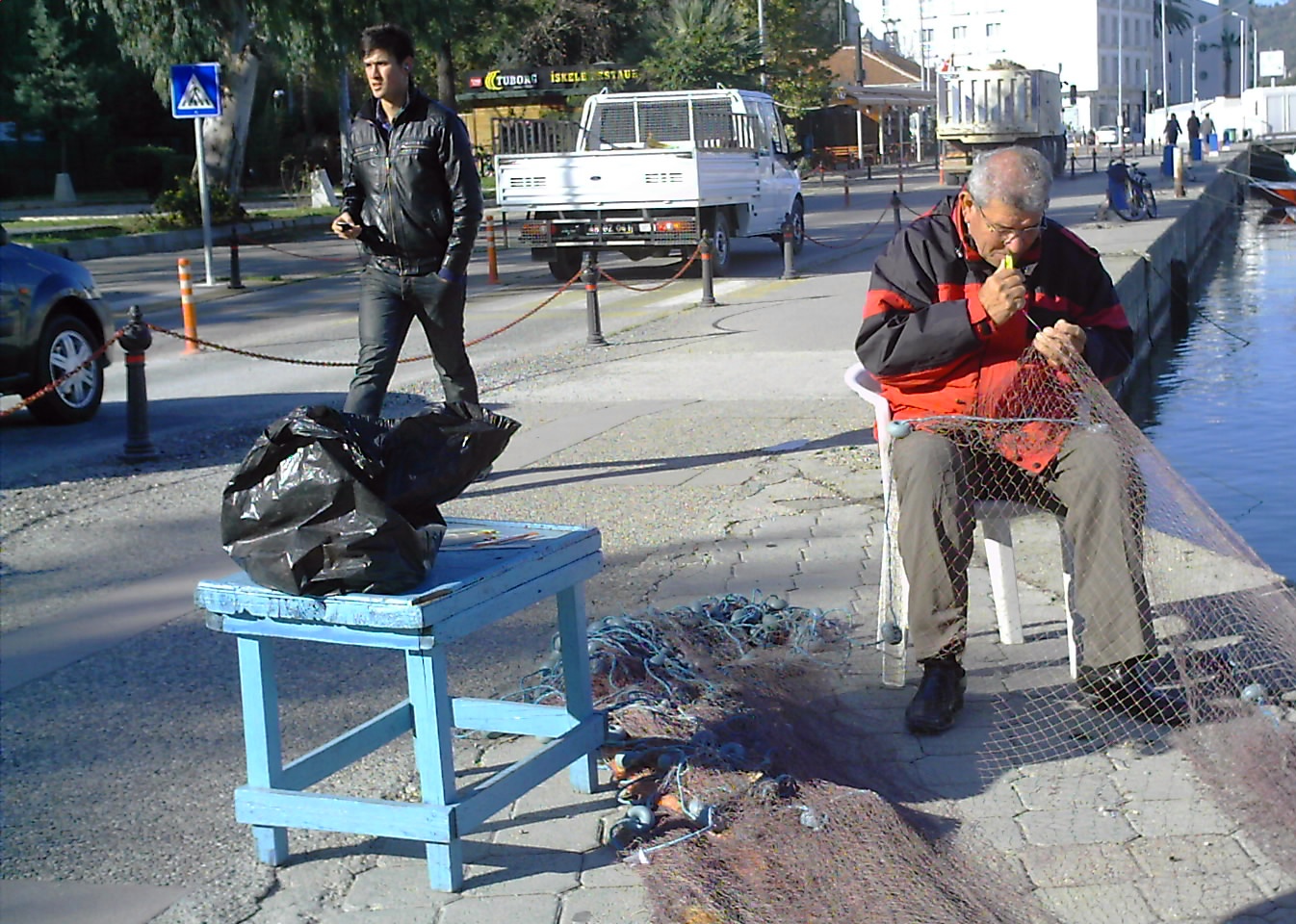
Fethiye - Fisherman mending his nets along the harbor wall. He has a lot
of work as I saw at least six or seven piles of holy nets to be mended.
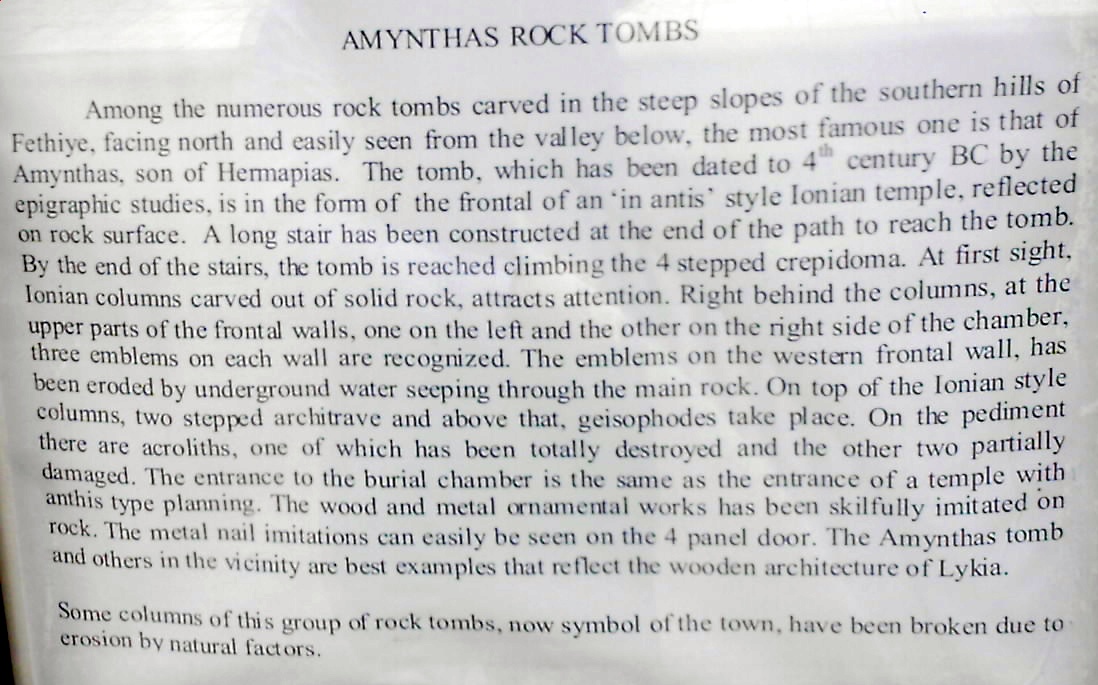
Fethiye - Poster at the base of the trail leading up to and explaining
the ancient rock tombs.
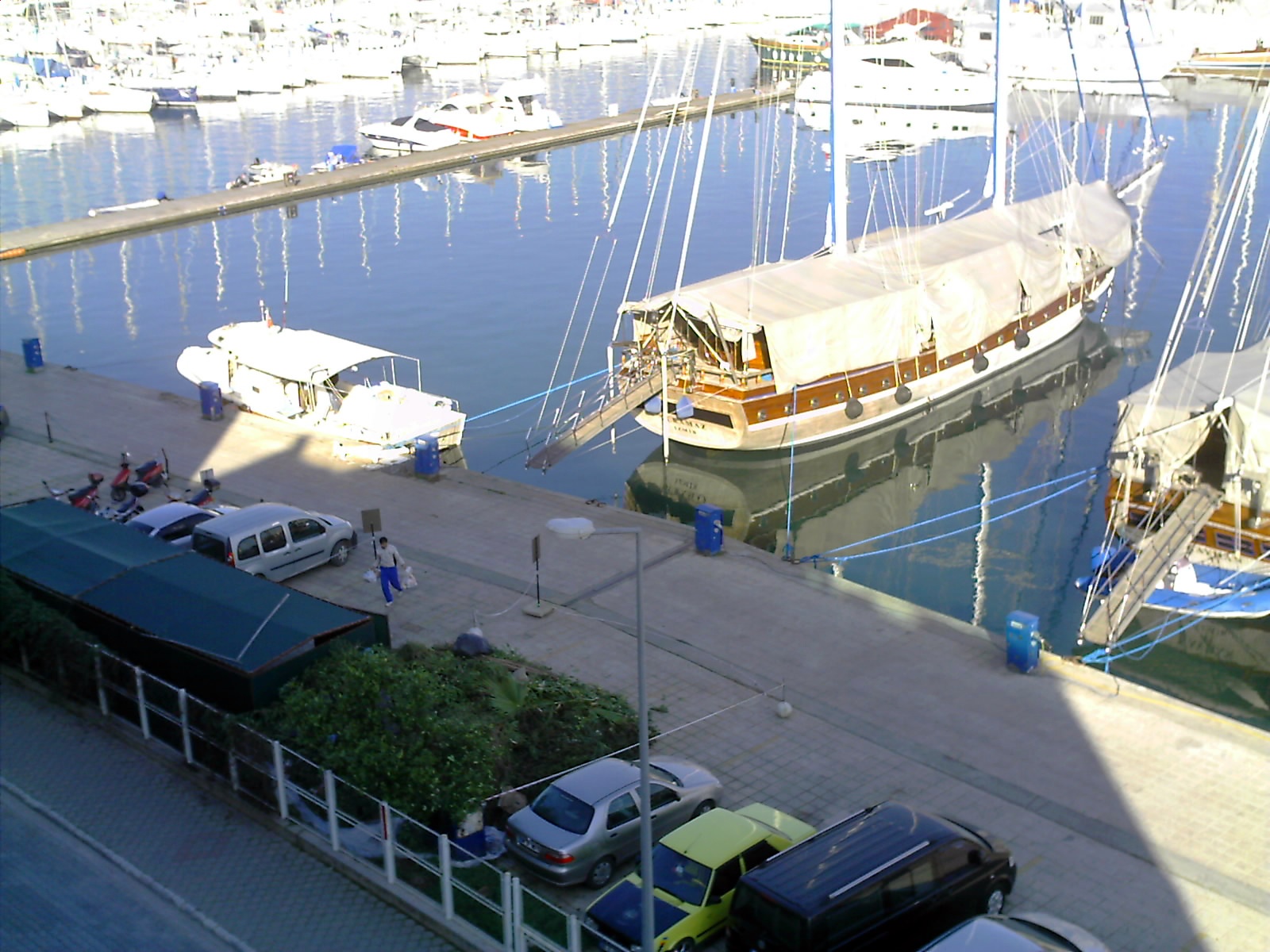
Fethiye - The street below my
room from the balcony in my room at the Alesta Yacht Hotel where I
stayed.
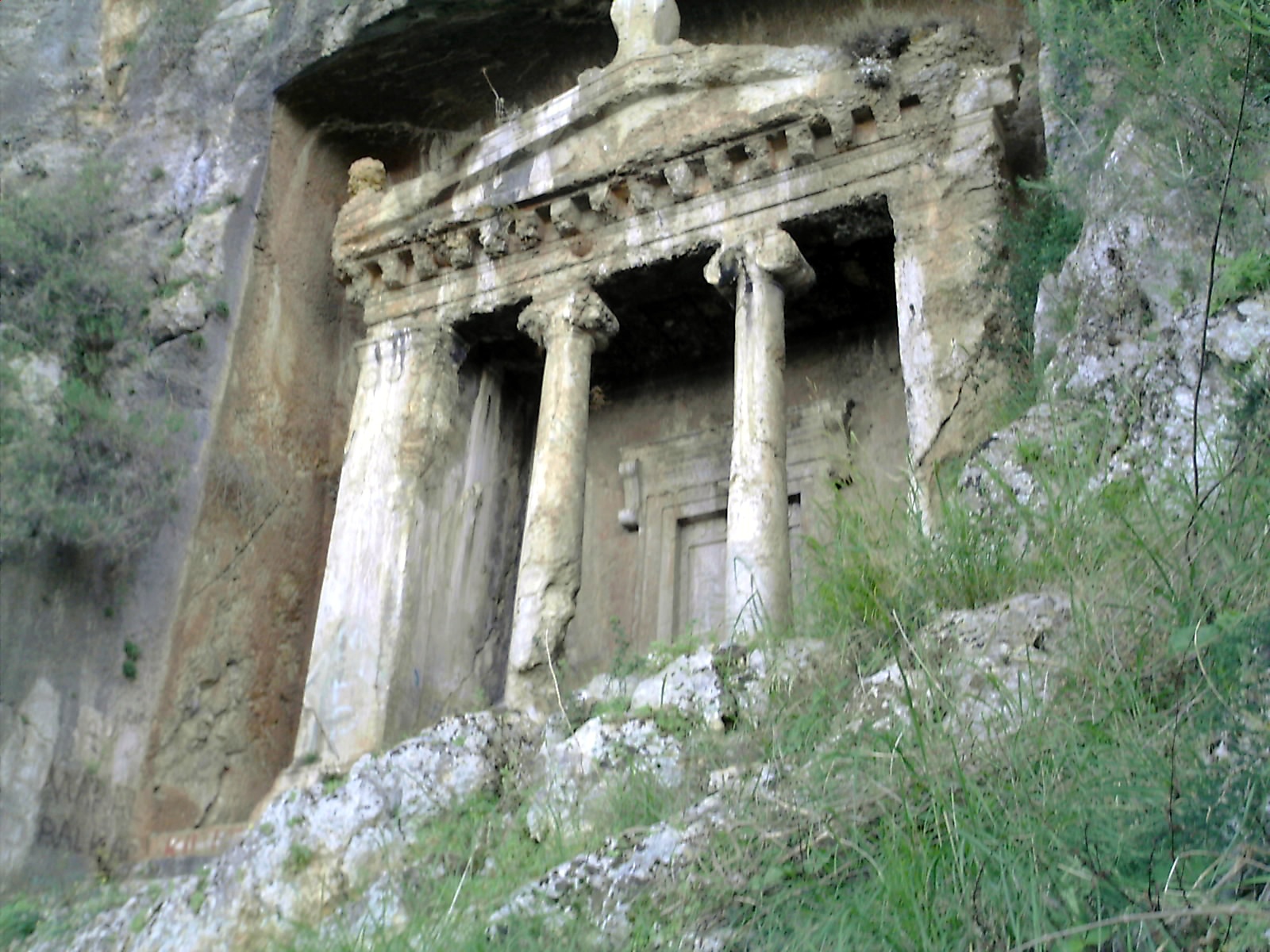
Fethiye - Closer to the base of the main tomb most features are clearly
visible.
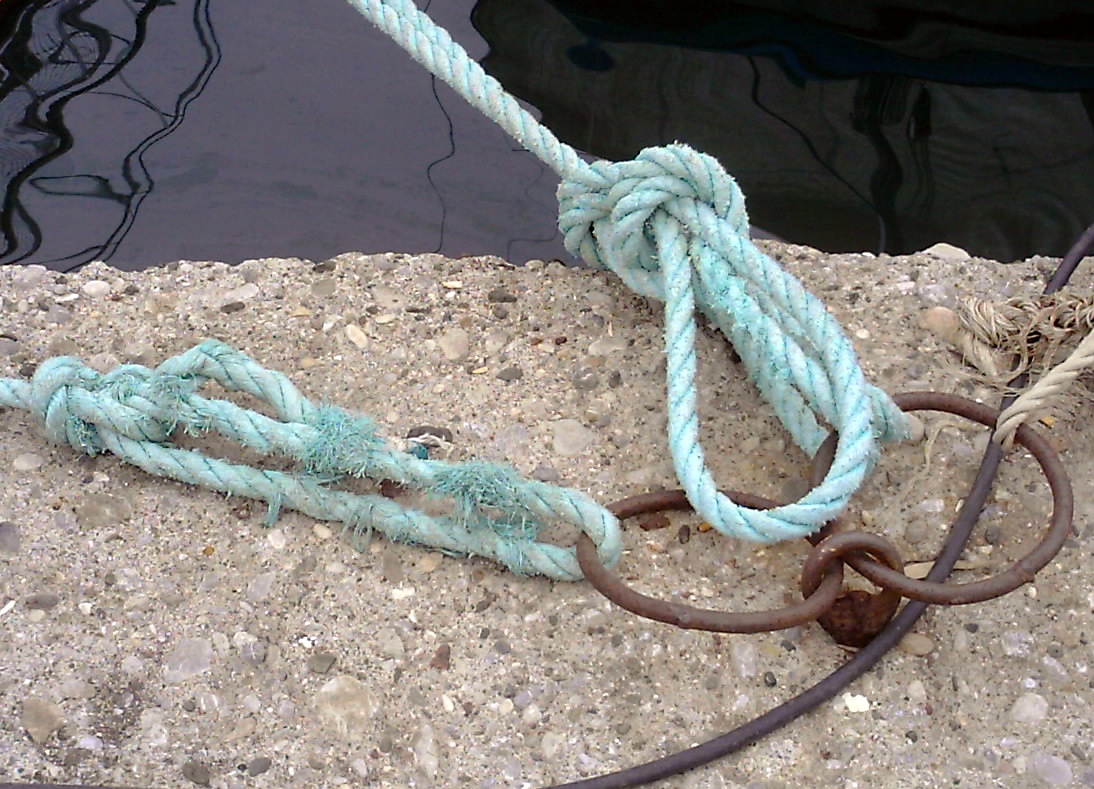
Fethiye - Ropes and rings hold the harbor together with both visiting
and resident boats.



